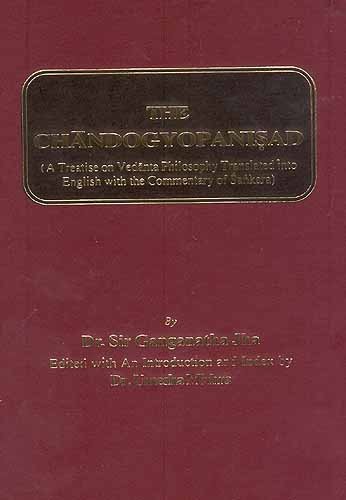Chandogya Upanishad (Shankara Bhashya)
by Ganganatha Jha | 1942 | 149,749 words | ISBN-10: 8170842840 | ISBN-13: 9788170842842
This is the English translation of the Chandogya Upanishad, an ancient philosophical text originally written in Sanksrit and dating to at least the 8th century BCE. Having eight chapters (adhyayas) and many sub-sections (khandas), this text is counted among the largest of it's kind. The Chandogya Upanishad, being connected to the Samaveda, represen...
Section 7.11 (eleventh khaṇḍa) (three texts)
Upaniṣad text:
‘That which is fully asleep, at perfect rest, and knows no dreams,—that is the Self’,—he said,—‘that is the Immortal and Fearless, that is Brahman’.— He went away, satisfied in his heart.—But before he got at the Devas, he saw this difficulty: ‘In truth, he does not know the Self at the time as this is I, nor does he know these things. It seems as if he had undergone annihilation. I see no good in this.’—(1)
With fuel in his hands, he came again. Prajāpati said to him—‘Indra, you went away satisfied in your heart; for what purpose are you coming again?’—He said—‘Revered sir, he does not know the Self at the time as this is I,—nor does he know these things; it seems as if he had undergone annihilation. I see no good in this.’—(2)
Commentary (Śaṅkara Bhāṣya):
As before, having said—‘Etaṃ tveva’ etc., (‘this indeed I shall explain further’), he has said ‘that which is fully asleep etc.,’—a passage that has been already explained.—‘The Seer seen in the Eye.’—‘Who moves about, worshipped in dream’,—‘that which is full asleep’, ‘at perfect rest and knows no dreams’,—‘that is the Self the Immortal and Fearless; this is Brahman—all this that He said was fully as he meant it.—But Indra saw a difficulty in this also—“How?”—‘In truth, he—the Self—does not,— while in deep sleep—know the Self;—he does not know It at all;—as what?—as ‘this is I’;—nor does he know these kings,—as he does in the waking or the dreaming state;—it seems as if he had undergone annihilation,—‘as if’ has to be understood as before;—‘undergone’—gone to—‘annihilation—appears as if i.e. annihilated;—that is to say, it is only when the cognition is there and the existence of the Cogniser’ (Self) can be understood,—not when the cognition itself is not there;—and when the man is in deep sleep, he is not found to have any cognitions;—hence, it follows that the cogniser has become annihilated this is what is meant, and it is not meant that Indra regards the man as to have become really annihilated,—at least so long as he believes in the truth of the assertion of his ‘immortality and fearlessness’.—(1-2)
Upaniṣad text:
‘So it is indeed, O Indra’,—said he—‘this I shall explain to you further; but none other than That; dwell here for another five years.’—He dwelt there for another five years; with regard to íwhich they say ‘for a hundred and one years did Indra dwell as a Religious Student, with Prajāpati’.—He said to him.—(3)
Commentary (Śaṅkara Bhāṣya):
As before, Prajāpati said, ‘So it is’; wha [what?] I have explained by means of three (practically) synonymous expressions,—That and none other than That, Self—not anything else—but That alone—I shall explain further;—only some little defect is left in you, for the removal of which, dwell here for another five years.’—Having been thus advised, he did as he was told. Therefore, when all his impurities and other defects had been completely washed off, Prajāpati explained to Indra the real nature of the Self, as free from the defects due to contact with three states (of waking, dreaming and deep sleep), and characterised by freedom from evil and other characteristics—These thus came to be a hundred and one years—fully completed; in regard to which cultured people say ‘for a hundred and one years did Indra dwell as a Religious Student with Prajāpati.’ This is what has been made up by the mention of ‘thirty-two’ (three times),—this is a side remark made by the text, apart from the anecdote (relating to Virocana—Indra—Prajāpati).
What is done by all this is to eulogise the knowledge of Self as that than which nothing is higher,—and which is higher than the position of Indra himself,—so much so that the said knowledge was acquired by him with such great effort and trouble extending over a hundred and one years.—(3)
End of Section (11) of Discourse VIII.
